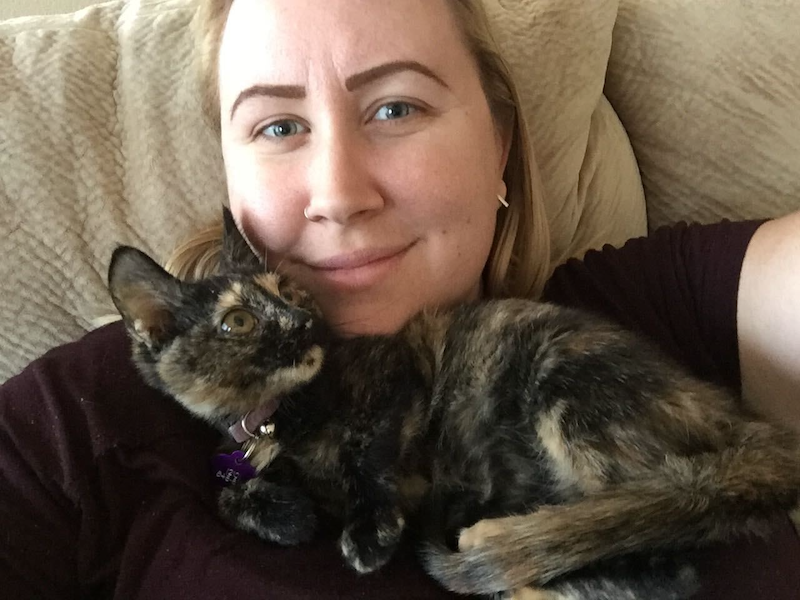This article was approved by Dr. Stephanie Liff, Lemonade’s favorite vet.
Feline Infectious Peritonitis (FIP) has long been one of the most dreaded diagnoses for cat owners. This fatal disease, caused by a mutation of the feline coronavirus (which is distinct from the human coronavirus, but we’ll get more into that below), has historically meant a heartbreaking end for affected cats.
However, a new treatment set to become legally available in the US on June 1, 2024 is poised to change the landscape of FIP treatment and bring hope to countless cat owners.
The new FIP treatment and what it means for cats
The upcoming FIP treatment represents a significant breakthrough in veterinary medicine. This treatment, based on antiviral drugs, has shown promising results in clinical trials, offering a potential cure for a disease that was once considered untreatable.
Research has focused on a drug called GS-441524, which inhibits the replication of the virus responsible for FIP. Studies have reported remarkable success rates, with many cats experiencing complete remission.
It’s rare as a doctor to have a disease evolve from a death sentence to a treatable disease. We are so lucky to have this new effective medication available.
Dr. Stephanie Liff
Keep in mind: As of June 1, 2024 the treatment is not FDA-approved.
How GS-441524 works
GS-441524 stops the virus that causes FIP from multiplying in a cat’s body. The recommended treatment involves giving the cat tablets for 12 weeks.
The medicine works much better when the disease is caught early, so it’s important to start treatment as soon as possible.
How does the FIP treatment process work?
The treatment process for FIP can involve several steps, including:
- Initial consultation and diagnosis: Diagnosing FIP can be challenging, as the symptoms overlap with many other diseases. The diagnosis of FIP often requires a thorough examination by a veterinarian—including blood tests, ultrasounds, and possibly biopsies. A PCR test (which uses the same technology as the PCR test for humans to detect a COVID-19 infection) is often used to detect the viral genetic material.
- Treatment initiation: GS-441524 tablet are administered, typically for 12 weeks.
- Monitoring and supportive care: Regular veterinary visits are crucial to monitor the cat’s response to treatment.
- Follow-up and completion: After completing the 12-week treatment course, follow-up tests are conducted to ensure the virus is gone. Some cats may require an extended treatment.
- Long-term outlook: Cats that respond well to treatment can go on to live healthy, normal lives. Continued monitoring and regular veterinary check-ups are recommended to catch any potential recurrences early.
How much does the treatment of FIP cost?
As of June 1, 2024, Stokes Pharmacy will be offering US-made oral FIP treatment in 50mg tablets at the following costs, not including shipping and taxes:
- 10 tablets for $195
- 20 tablets for $325
- 40 tablets for $546
Keep in mind: Cat parents will only be able to purchase the treatment with a veterinary prescription, and the dosage and duration of treatment can vary depending on each cat.
This cost doesn’t include veterinary consultations or supportive care needed during the treatment period, just for the medication itself.
It’s essential for cat owners to discuss financial planning and potential options with their veterinarians. Some veterinary clinics may offer payment plans or connect pet owners with organizations that provide financial assistance for critical treatments.
Will pet insurance cover the costs of my cat’s FIP treatment?
In many cases, yes! A basic Lemonade pet insurance policy will often cover the costs of your cat’s FIP treatment—minus your deductible and co-insurance—as long as it’s prescribed by a vet in the US who’s licensed to provide veterinary care in the state they operate in.
That said, pet insurance will not help cover the costs of your cat’s FIP treatment if it is related to a pre-existing condition, or if your plan’s relevant waiting periods weren’t up yet.
You can get your kitty covered with a Lemonade pet insurance policy from the time they’re two months old.
What is FIP?
Feline Infectious Peritonitis (FIP) is a complex and devastating cat disease that primarily affects domestic cats. The disease starts with a common feline enteric coronavirus (FECV), which is typically harmless.
However, in some cats, the virus mutates, leading to FIP. This mutation triggers an intense inflammatory response in the body cavity, which can occur in the abdomen, kidneys, brain, or other organs.
Statistics show that FIP affects approximately 1 in 200 cats in the US annually, with higher rates in multi-cat households and shelters. For many years, the prognosis for FIP has been grim, with a nearly 100% mortality rate.
There are two main forms of FIP: the wet form and the dry form. Each form affects cats differently and has distinct clinical signs (aka symptoms). Sometimes, the symptoms of the two kinds of FIP combine into a “mixed” form, where the infected cat might show symptoms of both kinds of FIP.
Wet FIP (aka effusive FIP)
The wet form of FIP is characterized by the accumulation of fluid in the cat’s body cavities, such as the abdomen or chest.
Some of the main symptoms include:
- Abdominal swelling: Cats may develop a pot-bellied appearance due to fluid buildup in the abdomen.
- Breathing difficulties: Fluid in the chest can make it hard for cats to breathe.
- Fever and lethargy: Cats often have a persistent fever and may appear very tired and weak.
- Weight loss: Affected cats may lose weight rapidly despite having a normal appetite initially.
Dry FIP (aka non-effusive FIP)
The dry form of FIP does not involve fluid accumulation but instead causes inflammatory lesions in various organs.
Some of the main symptoms include:
- Organ-specific issues: Depending on which organs are affected, symptoms can vary widely. For example, if the brain is involved, neurological symptoms like seizures or uncoordinated movements might occur. If the eyes are affected, you might see changes in the eyes or vision problems (aka ocular symptoms).
- Fever and lethargy: Similar to wet FIP, cats with dry FIP also often have a persistent fever and seem very tired.
- Weight loss and poor appetite: Cats may lose weight and show little interest in food.
- Enlarged lymph nodes: Some cats may have swollen lymph nodes that can be felt during a physical exam.
Can humans and cats share coronavirus infections?
No. Feline Infectious Peritonitis (FIP) has been a known disease since the early 1960s. It is caused by a mutation of the feline coronavirus (FCoV), which is distinct from the human coronaviruses responsible for illnesses like COVID-19.
Despite belonging to the same virus family, feline coronaviruses and human coronaviruses affect different species and cannot be transmitted between humans and cats. There is no evidence that the feline coronavirus can infect humans or that human coronaviruses can cause FIP in cats.
FIP treatment options until now

As a long time Veterinary Technician and now Pet Underwriting Associate Manager at Lemonade, I am deeply moved by the upcoming availability of the FIP treatment in the US. My kitten, Holly, tragically passed away from FIP in 2015 when there was no cure, and knowing that this life-saving treatment will soon be covered by Lemonade gives me immense hope and joy for other pet parents facing this devastating disease.
Britni, Pet Underwriting Associate Manager at Lemonade
Before the development of GS-441524, the treatment options for FIP were extremely limited. The disease was often considered a death sentence, and a major factor in the mortality of young cats, and many cat owners faced the heartbreaking decision to euthanize their beloved pets.
The black market for unapproved treatments, including remdesivir and other antiviral drugs, flourished as desperate cat owners sought any possible cure.
The new compounded version of the drug GS-441524 has been rigorously tested and offers a beacon of hope in the field of veterinary medicine and has the potential to save countless lives. The drug is technically still not approved in the U.S., but the FDA has explicitly said it “does not intend to take enforcement actions” against the compounded version.
Before we go…
Cat parents should stay informed about the latest advancements of FIP treatment and work closely with their veterinarians to ensure the best possible outcomes for their beloved pets.
While these treatments can be life-saving, they can also be quite expensive, potentially straining your finances. Pet insurance, like coverage offered by Lemonade, offers a valuable safety net, so you never have to choose between your pet’s well-being and your wallet.
Click below to start your free quote.
A few quick words, because we <3 our lawyers: This post is general in nature, and any statement in it doesn’t alter the terms, conditions, exclusions, or limitations of policies issued by Lemonade, which differ according to your state of residence. You’re encouraged to discuss your specific circumstances with your own professional advisors. The purpose of this post is merely to provide you with info and insights you can use to make such discussions more productive! Naturally, all comments by, or references to, third parties represent their own views, and Lemonade assumes no responsibility for them. Coverage and discounts may not be available in all states.




